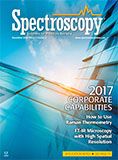CEM Corporation
Company Description
CEM Corporation is a leading global company specializing in scientific solutions for critical laboratory applications. We design and manufacture systems for analytical laboratories, bioscience applications, life sciences, and processing plants worldwide. Our product portfolio includes innovative instrumentation for sample preparation for elemental or chromatographic analysis, chemical synthesis, peptide synthesis, and other applications.

Chief Spectroscopic Techniques Supported
- ICP-MS
- ICP-OES
- Atomic adsorption
- GFAA
- MS-MS
Markets Served
CEM instrumentation is used by chemists, scientists, and technicians in private industry as well as leading universities, analytical laboratories, and research facilities around the world. We support numerous markets including the pharmaceutical, chemical, environmental, applied materials, food, and petroleum industries, among others.
Major Products/Services
CEM offers two platforms, a variety of vessels, and options for microwave digestion to ensure fast, complete, and reproducible digestions for a wide range of sample types. Run up to 40 samples simultaneously with the MARS 6 with One Touch(tm) Technology, a series of smart features that help automate the digestion process. MARS 6 automatically identifies and counts vessels, determines all of the parameters, adjust power output, and performs the digestion for all major sample types. Discover(r) SP-D digests most samples in 10 min or less including cooldown. Discover SP-D offers individual parameter programming for each sample and an optional Autosampler.
Facility
CEM's global headquarters, research laboratories, and manufacturing facilities are located in Matthews, North Carolina. The company has subsidiaries in the United Kingdom, Ireland, Germany, Italy, France, and Japan as well as more than 50 distributors worldwide.

CEM Corporation
PO Box 200,
Matthews, NC 28106s
TELEPHONE
(704) 821-7015
(800) 726-3331
FAX
(704) 821-7894
WEB SITE
NUMBER OF EMPLOYEES
USA: 225
Elsewhere: 65
YEAR FOUNDED
1978

Newsletter
Get essential updates on the latest spectroscopy technologies, regulatory standards, and best practices—subscribe today to Spectroscopy.
The Rising Role of Near-Infrared Spectroscopy in Biofuel Innovation
July 25th 2025A new bibliometric study published in Infrared Physics & Technology highlights the growing global impact of near-infrared (NIR) spectroscopy in biofuel research, revealing key trends, contributors, and future directions for advancing sustainable energy solutions.
Best of the Week: The Emerging Leader in Molecular Spectroscopy, Big Pharma’s Manufacturing Shift
July 25th 2025Top articles published this week include a feature article about big pharma’s investments in U.S.-based manufacturing, an article about the 2025 Emerging Leader in Molecular Spectroscopy Lingyan Shi, and some news items detailing the winners of the Coblentz Society’s student awards.